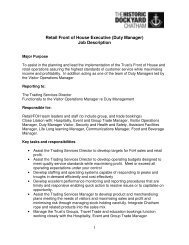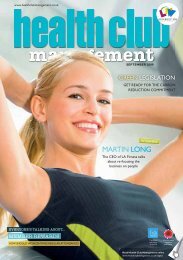sporting - Leisure Opportunities
sporting - Leisure Opportunities
sporting - Leisure Opportunities
Create successful ePaper yourself
Turn your PDF publications into a flip-book with our unique Google optimized e-Paper software.
RESEARCH<br />
TARGETING MEN’S HEALTH<br />
THROUGH SPORT<br />
PREMIER LEAGUE HEALTH<br />
A<br />
collaboration between Leeds<br />
Metropolitan University’s<br />
Centre for Men’s Health and<br />
the Carnegie Research Institute,<br />
Premier League Health is a national<br />
programme of men’s health delivered<br />
through 16 Premier League football<br />
clubs. The three-year programme<br />
is funded by the Football Pools and<br />
aims to improve the health of men<br />
aged 18-35 years through a range of<br />
activities delivered within a football<br />
context. Jim McKenna, Professor of<br />
Physical Activity and Health at Leeds<br />
Metropolitan University, answers<br />
some questions about the project:<br />
What does the Premier League Health<br />
programme consist of<br />
Activities are led by staff trained<br />
in health enhancement who are<br />
employed by the clubs. Activities<br />
include awareness-raising events<br />
on match days for supporters, programmes<br />
of weekly activities and<br />
sustained outreach work with groups<br />
of local men. One element of the programme<br />
at Newcastle United involves<br />
linking with men from the South Asian<br />
community in Newcastle’s west end,<br />
in particular men employed in the<br />
fast food takeaway and taxi industries.<br />
Knowing that this group of men<br />
has a heightened risk of cardiovascular<br />
disease, health trainers run a local<br />
programme of badminton supported<br />
with health advice delivered in local<br />
community venues. To fit in with the<br />
work routines of these men, sessions<br />
are run between midnight and 2am.<br />
What is so good about delivering<br />
health activities through football clubs<br />
Initial findings show that Premier<br />
League Health (PLH) provides an informal<br />
and supportive environment to<br />
engage men, including those not meeting<br />
health guidelines and not likely<br />
to visit their GP. Our research found<br />
that fewer than 20 per cent of men<br />
reported taking part in sufficient physical<br />
activity to benefit health, while<br />
over a quarter smoked and almost<br />
half exceeded recommended limits<br />
for alcohol consumption. Fewer than<br />
10 per cent visited their GP regularly,<br />
so taking part in PLH provided participants<br />
with a means of receiving<br />
support with lifestyle issues. However<br />
the impact of the programme tends to<br />
be much broader than improvements<br />
in areas such as weight and blood<br />
pressure. The programmes run by<br />
clubs such as Manchester United aim<br />
to help unemployed men get back into<br />
work, for example.<br />
Is it only supporters of the football<br />
clubs involved who take part<br />
No, a quarter of the men were not<br />
fans of the club where they attended<br />
the interventions. This emphasises<br />
the broader reach of football in connecting<br />
with men on health issues.<br />
What are the strongest<br />
features of the programme<br />
Our research found that tailoring activities<br />
to the needs of men is important.<br />
The oldest participant is 75 and<br />
attends the programme at Fulham. For<br />
this gentleman, playing football was<br />
not appropriate, so the staff prepared<br />
a programme of physical activity that<br />
was more suitable for him.<br />
All of the clubs are able to offer<br />
examples of men who have engaged<br />
the programme and flourished. An<br />
important ingredient is the ability<br />
of health trainers and staff delivering<br />
the programme to listen, plan and<br />
cater for men with diverse needs.<br />
Staff are not only helping men with<br />
poor health, but also those impacted<br />
by unemployment, family breakdown<br />
and substance use. Programmes are<br />
delivered in collaboration with local<br />
A final report into<br />
the Premier League<br />
Health programme<br />
will be published by<br />
the end of 2012<br />
partners, including PCTs, who provide<br />
opportunities for onward referral<br />
to specialist health services. The programme<br />
provided an opportunity for<br />
some men to confirm their health status<br />
and validate going to see their GP<br />
before it was too late.<br />
PHOTO ©SHUTTERSTOCK/ RTIMAGES<br />
What are the wider implications for<br />
the leisure industry<br />
Sporting and leisure contexts provide<br />
an alternative channel to reach<br />
men with health interventions. Sports<br />
clubs, spectator sports and venues<br />
such as comedy clubs offer an informal<br />
setting. Interventions can be<br />
accessed in social groups; this helps<br />
remove some of the perceived risk<br />
associated with engagement.<br />
Given that social support is an<br />
important element of changing health<br />
behaviours, leisure settings provide<br />
an arena where interventions may be<br />
developed. Activities delivered in a<br />
community environment at times which<br />
are more convenient may be more<br />
appealing to some men than traditional<br />
healthcare environments. ●<br />
56<br />
Read <strong>Leisure</strong> Management online leisuremanagement.co.uk/digital ISSUE 2 2012 © cybertrek 2012
















